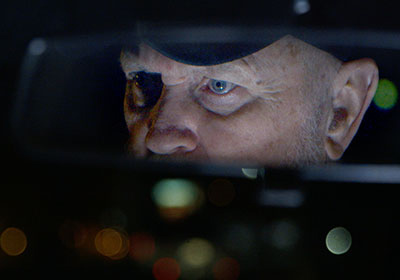
Prisons are a popular subject for films nowadays, not surprising since more and more people are living behind bars – 2.4 million in the United States. Private prisons are the new game: Fill ’em up and make a killing. More than 50 percent of the “youth correctional facilities” are privately run. The profit motive, along with harsh laws for drug possession, has resulted in mass incarceration that some call the New Jim Crow, as most of the inmates are disproportionately of color. There are more African-Americans in correctional facilities now than there were slaves in 1850.
The American criminal justice system is broken, and several films at New York’s Tribeca Film Festival this year show how. The Return offers some of the few heartwarming stories coming out of prisons. Proposition 36 in California repealed many of the harsh “three strikes and you’re out” laws that sent many nonviolent offenders to prison. Consequently many prisoners are unexpectedly being released ahead of time. The film follows some of them and shows how they deal with their newfound freedom. Guess what? Many can’t handle it.
Though cinematically predictable, this film has a heart, and reveals the tragic effects imprisonment metes on most prisoners. Society is not set up to deal with felons, jobs are not there, and families have often given up on their imprisoned relatives. And often prisoners return to the same bad environment, trying to regain their friendships and start a new life. Two young white women, directors Kelly Duane de la Vega and Katie Galloway, gained the trust of the mostly Black cast, and their film offers many personal and touching moments. Their previous work has addressed civil and human rights and political activism. Probably the most ironic moment in the movie occurs when Nina Simone’s poignant anthem “I Wish I Knew How It Would Feel To Be Free” plays during the ending credit rolls. The trailer can be seen here.
Tribeca also offers virtual reality exhibits along with films, talks and other events. One exhibit recreates what it would feel like to live in solitary confinement, in an 8×10-foot cell for 23 out of 24 hours every day for the rest of your life. Not that you could even imagine what that would feel like, but many attending the Festival put on the glasses and pretended.
A new doc by director Kristi Jacobson actually shows the reality of this extreme imprisonment. Solitary allows the viewer to enter the confines of Virginia’s maximum security Red Onion State Prison. Here we visit lost souls, forgotten men who somehow ended up in hell on earth. They are trapped in a monotonous routine of food plates slipped through cracks in the door, no sight of outdoors – ever (!) – and complete isolation from the world, except for the prison guards who monitor their every move. The privileged access provides in this film a view of something we really would never like to see. Some of these men have mental illness, some have been in for over 50 years! And the director garners amazing confessions and stories from both the prisoners and correctional officers. As excruciatingly painful as some scenes are to watch, you can only imagine what it’s really like when the cameras are not around. Punishment gone berserk.
A new class of untouchables in America
We all know sexual predators are monsters, right? The majority of people in the world, and certainly Ron Hooks, Florida millionaire lobbyist, despises them and will do anything possible to keep them out of his way and locked up. His daughter Lauren had a nanny for most of her youth who was a predator, and he is making up for the years he unwittingly allowed his daughter to suffer. He helped establish laws that created a registry that tracks and posts the location of all former sex offenders.
The key term here is “former.” Do you believe once a sex offender always a sex offender? Even some murderers leave prison rehabilitated after serving their time, but this doesn’t seem to apply to sex offenders. This film takes an uncomfortable position of sympathizing with those who are trying to return to society and redeem themselves. But the draconian laws sponsored by Hooks in Florida, part of the bill signed by President Clinton in 1994, is unintentionally destroying families. California repealed its Three Strikes Law, but Florida is proud to have the harshest laws against sex offenders. After serving prison terms they are not allowed to live within 2500 feet of any school, bus station or wherever children play. This forces them to live outside of town, and many have to sleep in pop-up tents because they have to report to check-in points every evening to be surveilled. And once you’re on the list you can never be removed or considered rehabilitated.
The engrossing documentary Untouchables follows several individuals, including an older bearded pedophile and a tall thin Black man who spent four years in prison for once showing up seven minutes late for a meeting. Statistics show that re-offense is not affected by any of these harsh laws, staying regularly at only 3.5 percent. A girl who at 16 had sex with a 15-year-old boy was sentenced to prison for years. Now she is a mother trying to raise her children properly but is on the registry for life. The film moves from one side of the story to the other, showing sympathy for victims of sex crimes, yet appealing for compassion and reason when dealing with the rehabilitation of former offenders. Families who want their loved ones to return to normal life after serving their time have organized rallies to protest the harsh laws. The film interviews several people who have changed positions and sided with them. Certainly a difficult subject to address, but director David Feige shows tremendous compassion and respect for all involved. He won the New Documentary Director Award at Tribeca.
Although not a prison, it could be named that by many of the refugees trapped behind its walls. After Spring, a Jon Stewart production, documents the growing refugee crisis resulting from the tragedy in Syria. It was filmed in the Zaatari Refugee Camp administered by the UN in Jordan, the second largest of its kind, with 80,000 of the over 60 million refugees now living in the world. One in 112 people on earth are now refugees. Going on six years, internees have no idea how long it will last. In the meantime, people attempt to carry on a life with dignity and regularity. One South Korean living in town comes out to the camp daily to build a space for Tae Kwon Do classes, offering one of the few diversions for the lost children in camp. The film follows several families dealing with structural issues, food and health problems, and basically dealing with the extreme limitations of life in a city built on desert sand. One man says, “I’ll return to Syria only when Assad is gone,” while another family plans to return, saying their former village is gradually recovering to normalcy. Although the film follows a formulaic structure, the photography is stunning, providing the viewer with the intimate realities of life in a refugee camp. The trailer can be viewed here.
Photo: A scene from the controversial film, Untouchables.

MOST POPULAR TODAY


Zionist organizations leading campaign to stop ceasefire resolutions in D.C. area

High Court essentially bans demonstrations, freedom of assembly in Deep South

Afghanistan’s socialist years: The promising future killed off by U.S. imperialism

Communist Karol Cariola elected president of Chile’s legislature




Comments